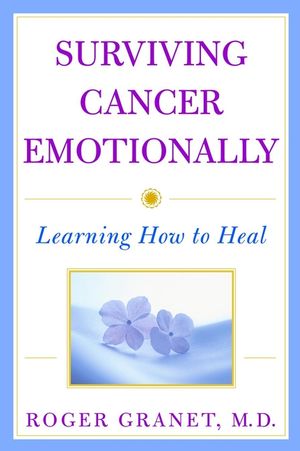Surviving Cancer Emotionally: Learning How to HealISBN: 978-0-471-38741-1
Paperback
240 pages
October 2001
 This is a Print-on-Demand title. It will be printed specifically to fill your order. Please allow an additional 10-15 days delivery time. The book is not returnable.
|
||||||
This user-friendly guide to surviving a cancer diagnosis and the ensuing treatment will be enormously helpful to patient and their intimates. A consulting psychiatrist at Memorial Sloan-Kettering, Granet provides a wealth of information about many types of cancers and treatments such as surgery, radiation, chemotherapy, and bone marrow transplants. But his central focus is the emotional toll of all aspects of the disease and the importance of seeking support from many of the available resources to cope successfully. While Granet gives no credence to the theory that particular personality traits contribute to cancer, he does insist that a patient's emotional well-being improves her quality of life. In order to maintain emotional health, he recommends strategies for copying after diagnosis, and during and after treatment (one patient struggles with "the endless waiting" leading up to and following tests and treatments). He addresses the fear of recurrence and death. Since the needs and preferences of cancer patients differ, he recommends a variety of workable techniques, based on compelling case histories, such as counseling, participation in support groups and a renewed reliance on caretaking by friends and family. He also believes that all patients benefit from acknowledging their difficult emotions rather them blurring them with alcohol or drugs; indeed, in his customarily compassionate, calm manner, readers will sense that he does not turn away from difficult feelings and fears. He does, though, advocate pain medication as an important tool when appropriate. Nothing that cancer survivors often gain deeper spiritual values and emotional maturity, the author sees the possibility of strength and grace where people often expect humiliation and dysfunction. (Oct.) (Publishers Weekly, September 3, 2001)"Dr. Granet provides ways to help people heal emotionally as theycope with an illness that carries great fears with it. Patients andfamilies will find this book a helpful companion as they undertakethe cancer journey with all its twists and turns."--Jimmie Holland,M.D., Chairman, Department of Psychiatry, Memorial Sloan-KetteringCancer Center
"Dr. Granet is a caring physician with a heart and soul, and anunusual gift for telling a story. This book should be read byanybody who has cancer, or who has a loved one with cancer."--Robert Michels, M.D., University Professor of Medicine andPsychiatry, and former Dean, Weill Medical College of CornellUniversity
"An extremely helpful book for all suffering from cancer. Itaddresses both the medical and psychological issues comprehensivelyand sensitively, providing patients with the information they needto face this challenge."--John A. Talbott, M.D., Professor ofPsychiatry, University of Maryland School of Medicine "Dr. Granet provides ways to help people heal emotionally as they cope with an illness that carries great fears with it. Patients and families will find this book a helpful companion as they undertake the cancer journey with all its twists and turns."--Jimmie Holland, M.D., Chairman, Department of Psychiatry, Memorial Sloan-Kettering Cancer Center
"Dr. Granet is a caring physician with a heart and soul, and anunusual gift for telling a story. This book should be read byanybody who has cancer, or who has a loved one with cancer."--Robert Michels, M.D., University Professor of Medicine andPsychiatry, and former Dean, Weill Medical College of CornellUniversity
"An extremely helpful book for all suffering from cancer. Itaddresses both the medical and psychological issues comprehensivelyand sensitively, providing patients with the information they needto face this challenge."--John A. Talbott, M.D., Professor ofPsychiatry, University of Maryland School of Medicine "Dr. Granet provides ways to help people heal emotionally as they cope with an illness that carries great fears with it. Patients and families will find this book a helpful companion as they undertake the cancer journey with all its twists and turns."--Jimmie Holland, M.D., Chairman, Department of Psychiatry, Memorial Sloan-Kettering Cancer Center
"Dr. Granet is a caring physician with a heart and soul, and an unusual gift for telling a story. This book should be read by anybody who has cancer, or who has a loved one with cancer." --Robert Michels, M.D., University Professor of Medicine and Psychiatry, and former Dean, Weill Medical College of Cornell University
"An extremely helpful book for all suffering from cancer. It addresses both the medical and psychological issues comprehensively and sensitively, providing patients with the information they need to face this challenge."--John A. Talbott, M.D., Professor of Psychiatry, University of Maryland School of Medicine



